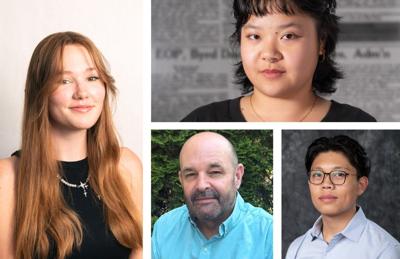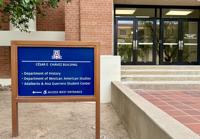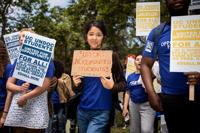
This story was originally published by EdSource. Sign up for their daily newsletter.
As local news outlets rapidly disappear, high school and college journalists are increasingly stepping beyond their campuses to report on their communities, helping to fill the news deserts left behind.
Palo Alto High School’s Verde Magazine has covered community reactions to the war in Gaza. UC Berkeley’s Daily Californian reports on city politics. Los Angeles Pierce College’s Roundup published a 2024 voter’s guide.
But like professional newsrooms, student publications are contending with shrinking budgets, censorship pressures and the challenges of covering underreported communities.
Blocked by the city government
Fullerton’s City Council voted in April to remove all non-government news publications from city property.
Jayden Lovelady was an opinion editor on Cal State Fullerton’s student newspaper, the Daily Titan, at the time. She returned this semester as editor-in-chief.
Lovelady said that she was extremely disheartened by the city council’s decision, especially considering that the Daily Titan and the Fullerton Observer are Fullerton’s primary sources of local news. Both were barred from distribution on city property, save one rack at the back of the public library.
“The Fullerton City Council, in my opinion, was robbing our community,” Lovelady said. “They’re making it more difficult for a lot of people in the community to get information that should be available to them.”
After attending a Fullerton City Council meeting on April 15, Lovelady said the support for local journalism during the public comment session reminded her of the issues journalism is facing nationwide.
“Quite a few people ended up being very unhappy and disappointed to see our city council echo this national crisis of ‘no one cares about the press anymore,’” Lovelady said.
As an aspiring journalist, Lovelady said that the council’s decision completely changed the way she viewed her career.
“I knew that I wanted to work in communications and in journalism, but my mindset before this past semester was really focused on entertainment and more PR,” she said. “This was the final nail in the coffin. I’m 100% committed to doing public policy reporting now and civil politics. I want to be one of those people on the ground holding leaders accountable.
“It’s one of the most important times that journalists remain watchdogs and remain loyal to the public, to information and to the truth,” She added. “And I definitely want to be a part of that now.”
Combating news deserts with student journalists
Steve O’Donoghue, longtime journalism teacher and scholastic journalism advocate, launched the SacSchoolBeat in 2021, frustrated by the lack of student journalism in the Sacramento area.
Previously, O’Donoghue taught for 33 years in the Oakland Unified School District, where he served as director of The Media Academy, a journalism magnet program at Fremont High School. A longtime member of the Journalism Education Association, O’Donoghue founded the California Scholastic Journalism Initiative and created county-wide journalism programs in Oakland, Los Angeles, Sacramento and Chico.
The Sacramento School Beat is an online newsroom featuring writers from Sacramento County high schools. O’Donoghue said that the goal of the Sacramento School Beat is to train students to become education reporters for their schools and districts, helping to address the lack of professional education reporters and inadequate coverage of schools and education in the region.
O’Donoghue first started the program in Oakland, inviting students from Bay Area schools without journalism programs. As a group, O’Donoghue and the students compiled a newspaper featuring their stories, which they distributed to their respective campuses.
Later, as more students signed up to join the Sacramento School Beat, O’Donoghue recruited professional journalists who volunteered to edit the paper and advise students. He said that student and professional journalist involvement helped the outlet reach more students who otherwise wouldn’t have known journalism was an option.
Because of limited funding, O’Donoghue says he can’t hire everyone who wants to join the SacSchoolBeat. He wishes journalism were part of more schools’ course offerings to make access to journalism convenient for all students.
“We’re trying to get money to keep it going. We got another 20 or so kids who have signed up for next year, but we have to get the funding to be able to pay,” O’Donoghue said. “We’re all competing against each other now, whereas if it was part of the curriculum like it used to be, there wouldn’t be an issue.”
Student Press Law Center
Mike Hiestand, senior legal counsel at the Student Press Law Center, co-edited The Lowell’s editorial in support of Eric Gustafson. Gustafson, previously a journalism teacher and adviser on the student newspaper at Lowell High School, is suing the San Francisco Unified School District. He claims he was reassigned after publishing a story about students complaining of verbally abusive teachers, according to the San Francisco Chronicle.
While he commonly deals with press freedom issues, Hiestand said that he has never seen anything on this scale in the 30 years he has been working in this field.
“My colleagues who were around in the late 1960s and 70s talked about some of the attacks on student speech taking place back then,” Hiestand said, “But it wasn’t something that I thought that I’d ever see.”
Hiestand said that he connects the rising number of attacks on journalism with the Trump administration’s efforts to diminish the value of the press.
One such issue that Hiestand said he sees is a trend with sources retracting statements that they were once eager to share with the press.
While appearing across multiple issues and stories, Hiestand said that he first noticed the trend in February, when Immigration and Customs Enforcement changed its policy, allowing agents to operate where they previously were unable to. He said that more sources seek anonymity, fearing retribution.
“They want to talk to their classmates about how this is impacting them and tell their stories,” Hiestand said. “It was apparent fairly quickly that there was some risk of doing that, and so the sources that students wanted to talk to — the ones who were being most impacted by this policy — they clammed up.”
Hiestand said that in addition to helping student journalists deal with increasing amounts of anonymous stories, the SPLC is constantly having to review its strategies and support for students.
“Our primary kind of service that we offer here is our free legal hotline, and certainly, we’ve seen calls coming into that hotline go up significantly,” Hiestand said. “They’ve got 30% more calls than this same time last year — a significant jump in people reaching out for help.”
Financial dependence
Vince Basada, news editor at UC Davis’s The California Aggie, said that their finances and ability to hire are dependent on the student government.
The student government oversees its hiring process, and funding is incorporated into the block fee that the student government collects and reallocates to various departments throughout the university.
Although this creates some ease in the hiring process for The Aggie editorial staff, Basada said that it also comes with a strange power dynamic with the student government.
“There is a conflict intrinsically between members of student government — members of any public government — and members of the press,” Basada said. “Our job is to push at them. To find cracks in their narratives. Find the holes in their stories. However, we are technically part of their system.”
Before being hired as an editor, Basada was on the student government beat. He said that he witnessed this conflict firsthand.
“I wrote a story in August or September that revealed that there was a big hiring scandal,” Basada said. “One of the unit directors here — and this slipped out in a meeting that was public — had improperly hired and improperly managed funds. The president of the association said ‘If this gets out, we could get sued. Make sure this does not leave this room.’ I was in the room and he didn’t realize that.”
After The Aggie published the story, Basada received backlash from the student government.
“Student government officials called my boss, saying I should get fired,” Basada said. “At the end of the day, my job in an interview is to push for answers, and their job is to make a good image of the association. And sometimes those things just don’t align.”
Basada said that this clash could lead to problems with sending budget requests to the student government. Because they control where the block fee is allocated, the student government has the power to reject The Aggies’ proposed budgets.
Basada said he would prefer student fees to cover The Aggie’s budget over the student government.
“I would like not to be financially bound to the association. It’s more important that we have our complete independence and not just our editorial independence.”
Fee referendums become lifelines
Adalia Luo, editor-in-chief of The UCSD Guardian, was studying abroad in Berlin over the summer when she received a notice from UC San Diego that the university would no longer financially support the print edition of the student newspaper.
Luo said that she was shocked and rushed to find a solution. She said that The Guardian’s print edition plays a crucial role within the UCSD community.
“We’re the only regular print publication on UCSD’s campus, and we’re the only print news publication,” Luo said. “There’s a lot to say about print. It’s more ethical. It’s more accountable. And it’s more accessible.”
The staff of The Guardian debated proposing a fee referendum — a measure that would allow The Guardian to receive a portion of student tuition fees for an additional $3.50 per quarter. However, getting the referendum passed faced multiple challenges, which Luo described as “nearly impossible.”
First, the referendum needed to be approved by the Associated Students, the Graduate and Professional Student Association and the Student Affairs Administrators before being put on the ballot.
Second, the referendum required not only a majority vote from the student body but also a minimum of 20% of the student population to participate in the vote. Luo said that this was the hardest factor in the referendum’s passing.
“I think it’s a tall order at any university, but it’s a really, really tall order at UCSD,” she said. “We average around 10% of voter turnout every year in the spring election, so we did not come into the situation very hopeful.”
After two weeks of presenting to the student government, emailing Student Affairs, distributing flyers around campus and urging fellow students to vote, the fee referendum passed in April.
Although the referendum was a landmark victory for The UCSD Guardian, Luo said that it is far from enough funding to create an environment ideal for cultivating journalism. The Guardian already has a staff of nearly 250, and can’t accept all applicants.
“There isn’t an academic journalism program at UCSD,” Luo said. “If somebody wants to do journalism, they can go to The Guardian, and that’s kind of pretty much the only option for a print newspaper.”
The Guardian has one camera for their photography team of 20. Different departments share emails because they cannot afford to maintain Google Suite accounts for everyone, and their office only has one desktop computer.
Additionally, when UCSD’s men’s and women’s basketball teams made the March Madness tournament for the first time in school history, a Guardian reporter paid out of pocket to cover games in Denver.
“It’s crazy that we’re missing these things that are important to our campus because we literally can’t pay for them,” Luo said.
However, Luo says that the referendum allows The Guardian staff to fulfill their fundamental concern — that journalism stays alive at UC San Diego.
Roman Fong is a second-year journalism and sociology major at San Diego State, and Nathalie Herrera is a second-year student majoring in journalism at Los Angeles Pierce College. They are members of EdSource’s California Student Journalism Corps.











(0) comments
Welcome to the discussion.
Log In
Keep it Clean. Please avoid obscene, vulgar, lewd, racist or sexually-oriented language.
PLEASE TURN OFF YOUR CAPS LOCK.
Don't Threaten. Threats of harming another person will not be tolerated.
Be Truthful. Don't knowingly lie about anyone or anything.
Be Nice. No racism, sexism or any sort of -ism that is degrading to another person.
Be Proactive. Use the 'Report' link on each comment to let us know of abusive posts.
Share with Us. We'd love to hear eyewitness accounts, the history behind an article.